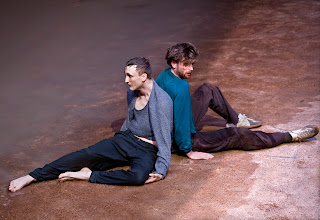'I am The Wind' review or 'Ever get that sinking feeling?'
'I am The Wind', Jon Fosse. Trans Simon Stephens
The Young Vic Theatre, Tuesday 10th May 2011
Written for Culture Wars
 |
| Tom Brooke and Jack Laskey as The One and The Other. Photo Credit: Simon Annand |
A strange whistling fills the air, like the noise a finger makes when it circles a wine glass. Moonlight creeps across a swampy stage. Water laps perilously close to the audience's feet and two men, The One and The Other, sail out to sea. Their journey is no holiday. The boys' boat is a sideless, hovering platform and one of the traveller's – The One, in fact – seems fixed on suicide. And yet, for all this miserable desolation, Fosse's play taps you on the shoulder and quietly insists that life, sometimes, really is beautiful.
It sounds a tad pretentious. Indeed, Jon's Fosse's oblique and bleak 'I am The Wind' does feel grindingly indulgent in places. If a sentence can be interrupted, it will. Be. If a word can be replaced with an ellipsis, it is cut. Much of the time, The Other (Jack Laskey) simply parrots back The One's (Tom Brooke – a distant but generous performance) melancholic utterances. The actors speak at a deliberate pace, further disrupting an already jolting script. The dialogue scrapes and stutters along, often at odds with the lulling ocean on which these two men drift.
And yet, for a play that is so wilfully ambiguous it is also uniquely tangible, close and physical. It might be tough to decipher what these two companions are discussing (it's a bit like eavesdropping on the musings of two heavily stoned students) but, at certain precious moments, it's impossible not to share their fear or joy, as they battle against the elements. These are two characters obsessed with the futility of words – so perhaps it makes sense that language, time and again, let's them down. What doesn't desert these travellers, though, is the simple pleasure or dread that the elements provoke. This life force – be it for good or bad – bubbles beneath the boat and between the lines, persistent and moving.
Slowly, under Patrice Chéreau's persuasive direction, nature's variable and awesome power is unleashed. The play opens on a soggy marshland as The Other, with a balletic swoop, lifts up The One and holds on for dear life. They are alone, one of them is possibly dead, and nature has all but disappeared. But, as we travel back in time to the beginning of their journey, with hope still afloat, nature's force surges onto stage.
This is felt most strongly with the first, massive reveal. As the two men re-cover their tracks and remember their journey, their 'boat' surges up from beneath the swampy landscape. A platform, barely discernible throughout the opening, rises up centre stage and sways, controlled by a mechanical underbelly. Water gurgles up from below and the stage becomes an ocean. Nature engulfs the boys and the audience feels, fears and admires it too.
There are no scene changes but there are important and decisive elemental shifts. A moment of calm reflection from the lads is amplified by the docile lapping of the waves, as a half light trickles across stage and ripples are projected throughout the theatre. At moments of deep despair, when The One is close to his longed-for jump, nature turns ugly: the lighting (a brilliant, endlessly shaded lighting design from Dominique Bruguière) turns harsh, the music – the wind and the sea – takes on a dangerous note and the platform rocks precariously.
Sometimes it feels like looking at a sunset; we forget ourselves for a second and exalt in something bigger and more beautiful. Other times, it feels like staring into the face of death, marvelling at our own mortality. And, in those rare moments when The Other jumps off the boat and attempts to moor the raft, his rough interaction with nature – his splashing, tugging and floundering – feels hopeful. It feels like living; dangerous, unpredictable but deeply satisfying and solid.
One senses the touch of an acutely precise director behind everything. Anything that might appear arbitrary is almost certainly not. The sudden emergence, and equally swift disappearance, of the sea is timed with poignant accuracy. The water adopts its own character and interacts seamlessly with the script. Its changing states catches the audience unawares. When we notice, with a shock, that the ocean has drained away completely, we feel humbled, awed by nature's graceful and unstoppable progress.



Comments
Post a Comment